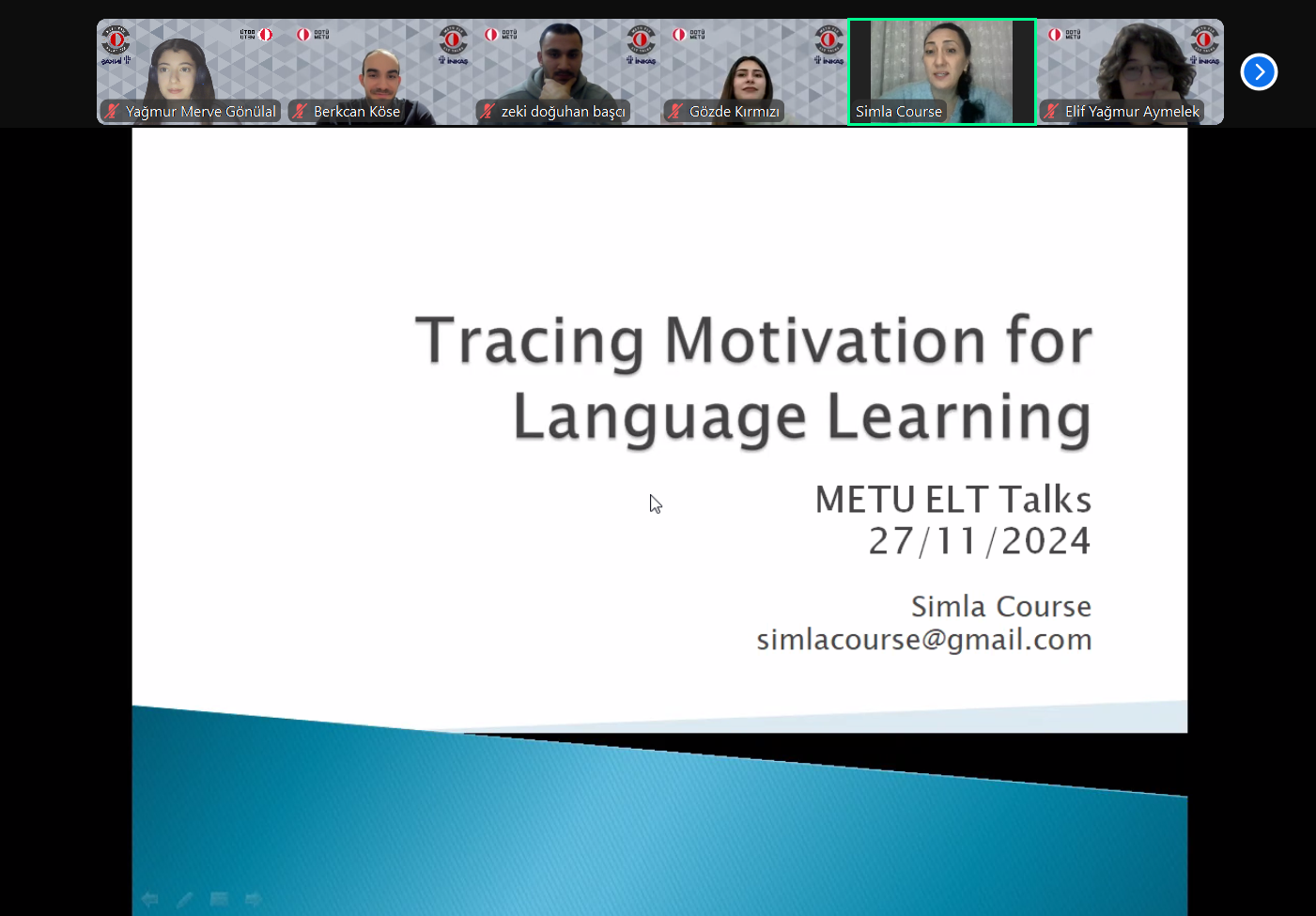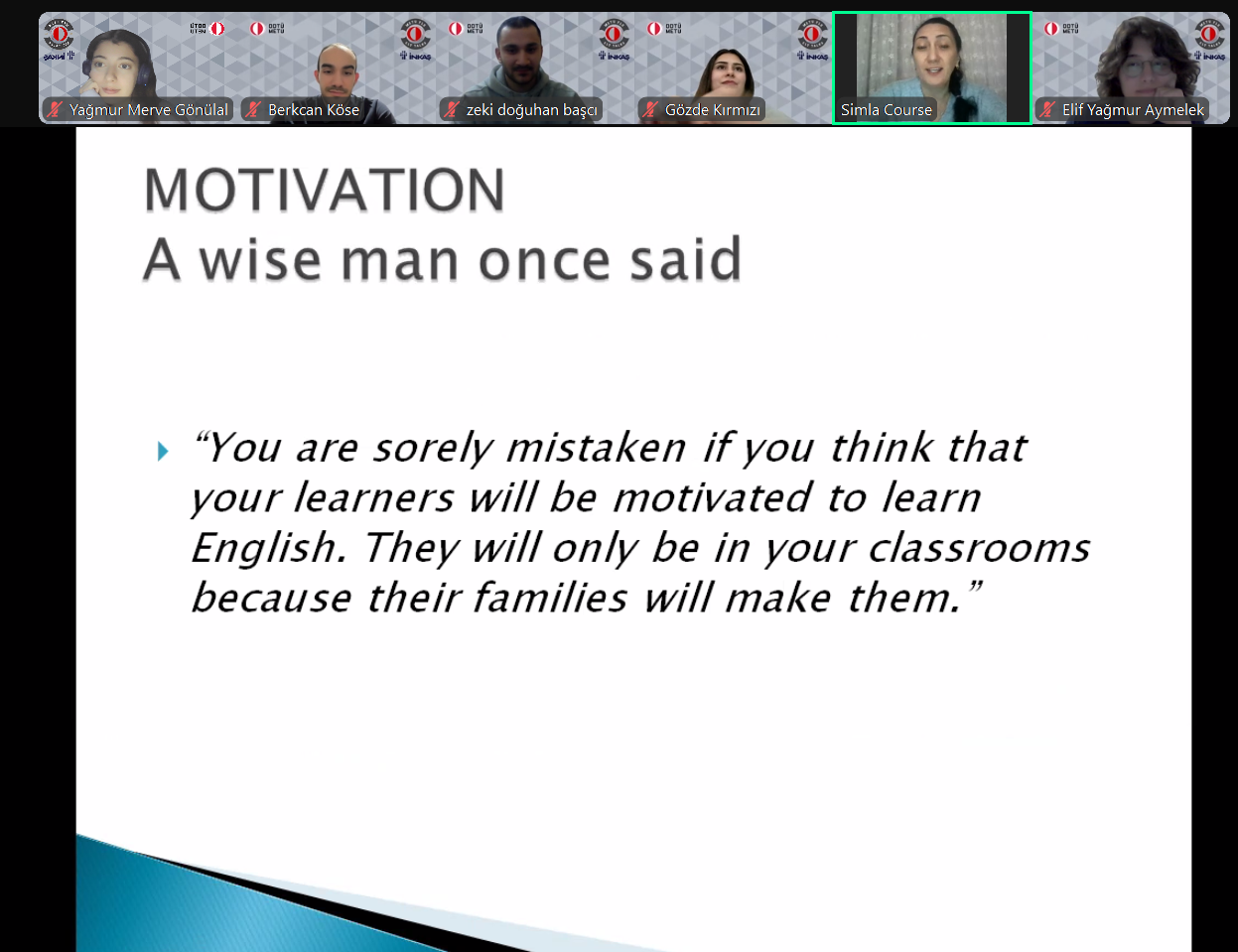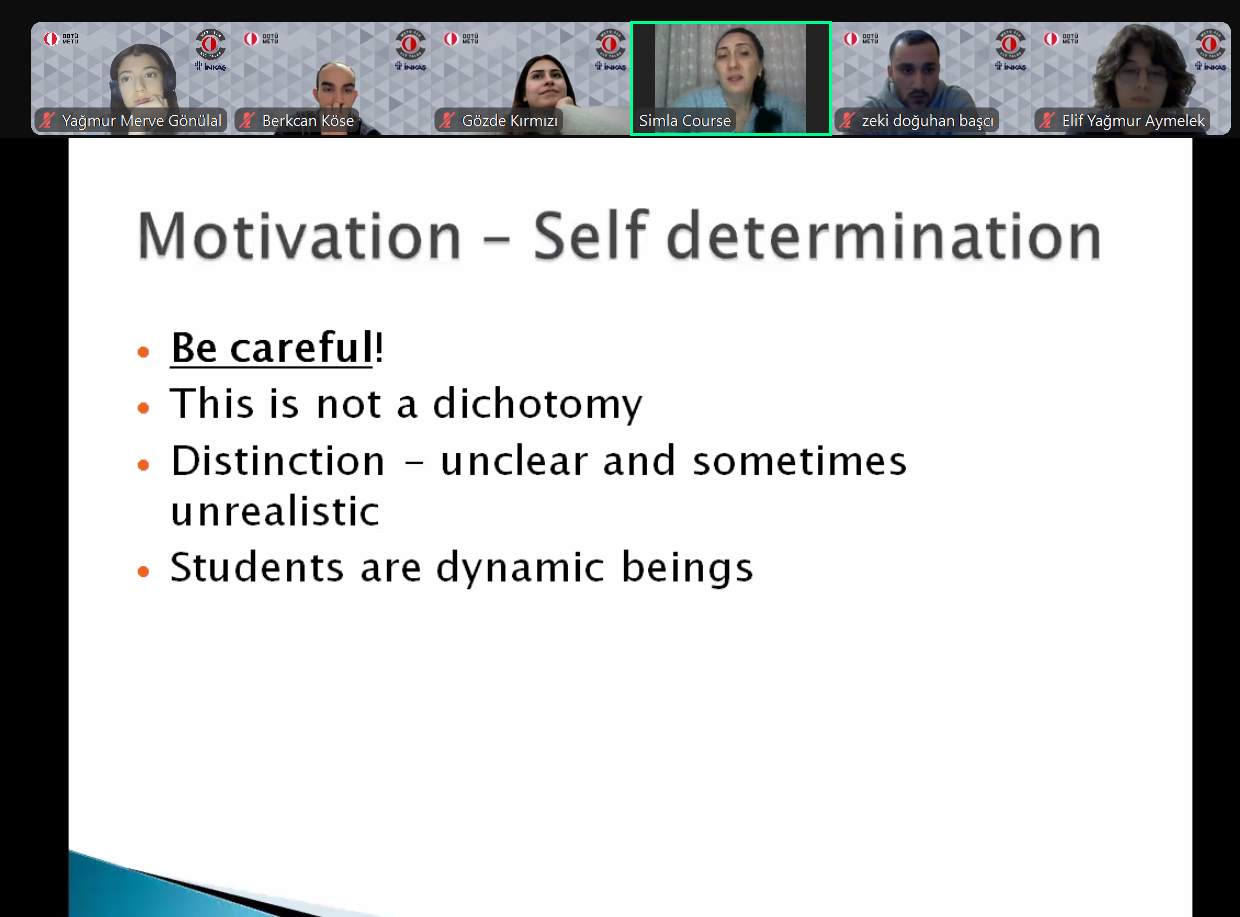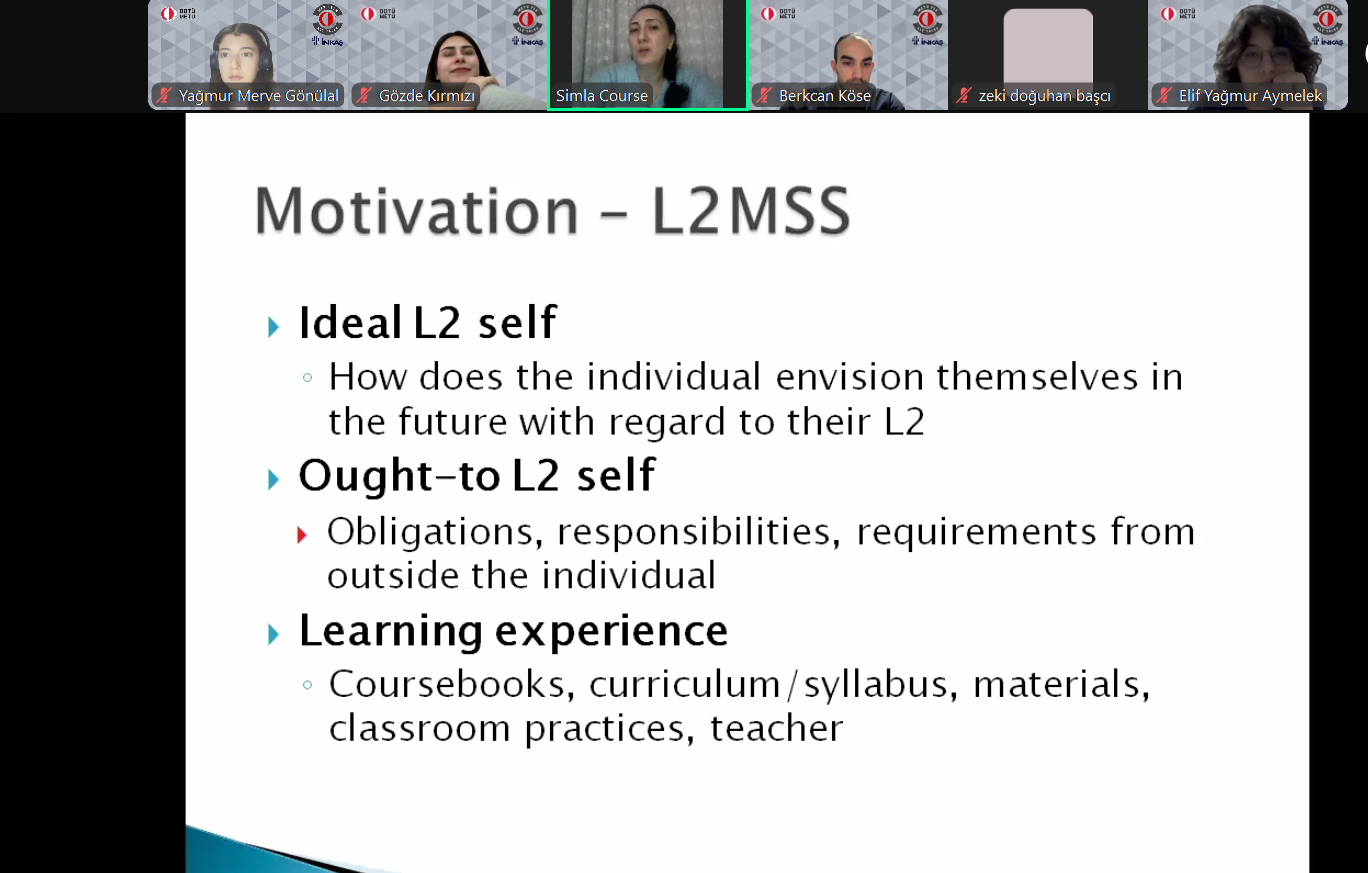METU FLE ELT Talks - Session 23 (Asst. Prof. Dr. Simla Course)
Session notes:
"You are sorely mistaken if you think your learners will be motivated to learn English. They will only be in your classrooms because their families will make them."
For our 23rd session of METU FLE ELT Talks, we had the honor of having Asst. Prof. Dr. Simla Course with us. This quote above was the starting point shared by Course, which belonged to one of her instructors and deeply stuck with her during her undergraduate years at METU FLE. She further explained this quote regarding how she previously assumed that students in her classrooms would be willing to be in class, whereas it might not always be the case.
When it comes to having an in-depth understanding of motivation, we should start by looking inward, asking ourselves what motivated us to learn English or become teachers. Similarly, we should also divert this question to our students, changing it into what motivated them to learn English. Was it because they just liked it, or was it out of necessity? Starting from these questions, Course moved on to asking more about motivation, such as its stability. Is it possible to motivate students and see its effect for the rest of their lives? Unfortunately, that is not the case. Well, how can we effectively motivate our students then? To be able to answer these questions, let us dive into the world of motivation.
Beginning with its foundations, the reinforcement theory of behaviorism is one of the most famous explanations, saying that we motivate learners through positive reinforcement. It can be praise, an extrinsic reward or a grade, which is the most common one used in the classrooms. However, there is a problematic assumption with this theory, which is that it assumes humans are predictable beings. As Course mentions, "I am not sure if it is true since humans are a lot more complex than they are predictable. Learners are not always equally motivated."
Another theory that involves certain learner aspects such as choice, belief, past experiences, and emotions compared to the reinforcement theory is the socio-cognitive theory. It views humans as agents capable of reflection, giving and creating meaning, and taking action. "Think about a student who sits at the very back in the classroom," Course explained, "this way, they make a point that they are not interested in the Course, and sometimes, the reason is that it is easier to think that I didn't want to try anyway rather than I tried and I failed. They do not want to lose self-respect. This is why cognition plays a significant role in motivation." In addition, she highlighted that since humans are conscious agents, the external conditions are bound to be subjective by nature. "Any reward that the learner receives, they can evaluate it differently than their classmates based on past experiences, emotions, etc."
Another perspective in motivation, titled achievement theory, states that when people feel motivated or demotivated, they consider how likely they will succeed or fail. Through this theory, research on motivation also shifted towards understanding the impact of belief regarding success or failure. It focuses on where learners attribute their success or failure to: Internal or external? Stable or unstable? Controllable or uncontrollable? "If you believe that you have the ability to learn English, it means you will spend more time learning it, ultimately being good at it and creating a recursive pattern." This is also highly related to Bandura's concept of self-efficacy, which is the learner's beliefs about their capabilities. People with high self-efficacy will likely spend more time and effort on learning, ending up being more successful, which will serve as proof. Verbal persuasion can also play a role in self-efficacy as, when someone is surrounded by their family or friends mentioning how they were unable to learn English, they will likely have low levels of self-efficacy regarding learning English as well. "But the good part about verbal persuasion is that it can also play a role for the other way around: Teachers can say or show learners that they are actually good at learning English."
In addition, self-determination theory introduces the concept that learning is something inherent, dividing motivation into two primary categories: Intrinsic and extrinsic. Intrinsic motivation simply comes from within, whereas extrinsic motivation depends on external factors: stars, chocolate, grades... Self-determination theory suggests that people are intrinsically motivated when they believe that learning will develop a competence for them. As Course underlines, "If you do not see a point, intrinsic motivation is likely to disappear." Another thing is that there should be an optimal level of challenge, and learning should be something new.
Autonomy is also a critical notion, as Course explains through a thought-provoking sentence, "If the students at school are given no control for decision-making in terms of how they learn a language, can we really expect them to be intrinsically motivated?" When people are intrinsically motivated, this feeling of enjoyment is always present. Intrinsic motivation, therefore, is precious since it can even encourage learners to choose challenging tasks without a need for an extrinsic reward. Furthermore, the social aspect of motivation should also be highly examined. When we are learning a language, vocabulary or grammar is not what the language only consists of; it also carries its culture and context.
When it comes to Gardner's Socio-educational model, two different definitions can be found. While integrative motivation represents an interest in the language, culture and people who speak the language, instrumental motivation carries the motivation through practical and economic advantages. As further research in EFL was conducted, the importance differed, yet one key was present: "There is no straightforward perspective as it can change based on different contexts, times and learners." Additionally, Course expressed a vital concern, "So far, research views learners as a homogeneous group that can be expressed in numbers such as 500 students with high self-efficacy, rather than seeing them as individuals and ultimately disregarding who they really are."
Last but definitely not least, another notion to be shared regarding motivation is the L2 Motivational Self-System (L2MSS). L2MSS is concerned with various components regarding the learner's understanding of themselves: Ideal self (How does the learner envision themselves about their L2 in the future?), ought-to self (represent obligations outside of the learner), and learning experience (coursebooks, classroom practices and the teacher). These three components of L2MSS seem to be explaining motivation greatly. However, we should underline that, as Course mentioned, the effectiveness heavily depends on the context or many other factors of the learners, such as age. As a final note, further research is highly needed as these theories evolve.
In a nutshell, the diverse world of motivation offers valuable opportunities for self-discovery. Theories we have noted, such as reinforcement, socio-cognitive, achievement, and self-determination, provide insights for our endless teaching and learning journey. We strongly believe that every teacher has the power to motivate by understanding motivation's complexities and appreciating each learner's uniqueness. By fostering curiosity and confidence, we can empower students to recognize their potential and motivate them to pursue their dreams."





